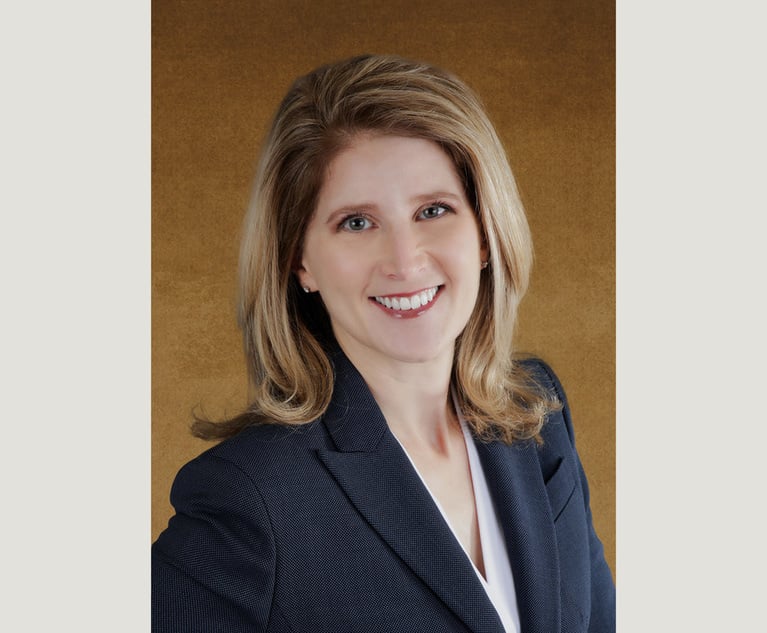 Danielle M. Parks,left, and Samantha D. Weigand,right, of Burns White. Courtesy photos
Danielle M. Parks,left, and Samantha D. Weigand,right, of Burns White. Courtesy photos Virtual or In Person—Where Do We Go From Here?
The majority of workers' compensation hearings and depositions are still being conducted virtually. This has posed the question of whether the practice of workers' compensation will ever return to how it was pre-pandemic.
October 04, 2023 at 12:57 PM
11 minute read
Special SectionsAs all workers' compensation practitioners know, our practice has been forever changed by the COVID-19 pandemic. Although the Pennsylvania workers' compensation bar took the COVID-19 pandemic in stride, with tremendous effort and effectivity on the part of the bureau and its director, our practice has been slow to return to the pre-pandemic normal. While Pennsylvania Bar Association events, continuing legal education programs, and even client and law firm functions have returned to in-person, the majority of workers' compensation hearings and depositions are still being conducted virtually. This has posed the question of whether the practice of workers' compensation will ever return to how it was pre-pandemic.
The topic of virtual versus in-person hearings and depositions was recently addressed by the Workers' Compensation Appeal Board opinion in Steibler v. PHI, No. Appeal Case: A22-0486, 2023 (Pa. Work. Comp. App. Bd. Feb. 14, 2023). The Workers' Compensation Appeal Board held that the workers' compensation judge (WCJ) had abused her discretion via a violation of the claimant's due process rights when she cited lingering COVID-19 concerns as the basis for denying the claimant's request that all testimony, including the testimony of the claimant, be completed via an in-person hearing, as opposed to a virtual hearing. The Workers' Compensation Appeal Board explained that the reason the WCJ abused her discretion is grounded in Section 131.54 of the Special Rules of Administrative Practice and Procedure Before Workers' Compensation Judges, which states, "at the discretion of the judge, the hearings may be conducted by telephone or other electronic means if the parties do not object." 34 Pa. Code Section 131.54. The Workers' Compensation Appeal Board reasoned that "because Section 131.54 does not allow the WCJ discretion to deny that request when there is an objection to the video hearing, we conclude that the WCJ acted contrary to the specific regulation governing the manner and conduct of hearings before the WCJ."
This content has been archived. It is available through our partners, LexisNexis® and Bloomberg Law.
To view this content, please continue to their sites.
Not a Lexis Subscriber?
Subscribe Now
Not a Bloomberg Law Subscriber?
Subscribe Now
NOT FOR REPRINT
© 2025 ALM Global, LLC, All Rights Reserved. Request academic re-use from www.copyright.com. All other uses, submit a request to [email protected]. For more information visit Asset & Logo Licensing.
You Might Like
View All
Pa. Supreme Court to Decide Enforceability of 'Browsewrap' Arbitration Agreements
8 minute read
From a Mediator’s Perspective: Common Mis-steps That Parties Make at Mediation
6 minute readLaw Firms Mentioned
Trending Stories
- 1‘Catholic Charities v. Wisconsin Labor and Industry Review Commission’: Another Consequence of 'Hobby Lobby'?
- 2With DEI Rollbacks, Employment Lawyers See Potential For Targeting Corporate Commitment to Equality
- 3In-House Legal Network The L Suite Acquires Legal E-Learning Platform Luminate+
- 4In Police Shooting Case, Kavanaugh Bleeds Blue and Jackson ‘Very Very Confused’
- 5Trump RTO Mandates Won’t Disrupt Big Law Policies—But Client Expectations Might
Who Got The Work
J. Brugh Lower of Gibbons has entered an appearance for industrial equipment supplier Devco Corporation in a pending trademark infringement lawsuit. The suit, accusing the defendant of selling knock-off Graco products, was filed Dec. 18 in New Jersey District Court by Rivkin Radler on behalf of Graco Inc. and Graco Minnesota. The case, assigned to U.S. District Judge Zahid N. Quraishi, is 3:24-cv-11294, Graco Inc. et al v. Devco Corporation.
Who Got The Work
Rebecca Maller-Stein and Kent A. Yalowitz of Arnold & Porter Kaye Scholer have entered their appearances for Hanaco Venture Capital and its executives, Lior Prosor and David Frankel, in a pending securities lawsuit. The action, filed on Dec. 24 in New York Southern District Court by Zell, Aron & Co. on behalf of Goldeneye Advisors, accuses the defendants of negligently and fraudulently managing the plaintiff's $1 million investment. The case, assigned to U.S. District Judge Vernon S. Broderick, is 1:24-cv-09918, Goldeneye Advisors, LLC v. Hanaco Venture Capital, Ltd. et al.
Who Got The Work
Attorneys from A&O Shearman has stepped in as defense counsel for Toronto-Dominion Bank and other defendants in a pending securities class action. The suit, filed Dec. 11 in New York Southern District Court by Bleichmar Fonti & Auld, accuses the defendants of concealing the bank's 'pervasive' deficiencies in regards to its compliance with the Bank Secrecy Act and the quality of its anti-money laundering controls. The case, assigned to U.S. District Judge Arun Subramanian, is 1:24-cv-09445, Gonzalez v. The Toronto-Dominion Bank et al.
Who Got The Work
Crown Castle International, a Pennsylvania company providing shared communications infrastructure, has turned to Luke D. Wolf of Gordon Rees Scully Mansukhani to fend off a pending breach-of-contract lawsuit. The court action, filed Nov. 25 in Michigan Eastern District Court by Hooper Hathaway PC on behalf of The Town Residences LLC, accuses Crown Castle of failing to transfer approximately $30,000 in utility payments from T-Mobile in breach of a roof-top lease and assignment agreement. The case, assigned to U.S. District Judge Susan K. Declercq, is 2:24-cv-13131, The Town Residences LLC v. T-Mobile US, Inc. et al.
Who Got The Work
Wilfred P. Coronato and Daniel M. Schwartz of McCarter & English have stepped in as defense counsel to Electrolux Home Products Inc. in a pending product liability lawsuit. The court action, filed Nov. 26 in New York Eastern District Court by Poulos Lopiccolo PC and Nagel Rice LLP on behalf of David Stern, alleges that the defendant's refrigerators’ drawers and shelving repeatedly break and fall apart within months after purchase. The case, assigned to U.S. District Judge Joan M. Azrack, is 2:24-cv-08204, Stern v. Electrolux Home Products, Inc.
Featured Firms
Law Offices of Gary Martin Hays & Associates, P.C.
(470) 294-1674
Law Offices of Mark E. Salomone
(857) 444-6468
Smith & Hassler
(713) 739-1250







